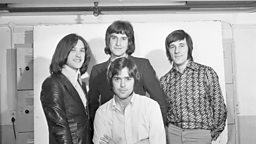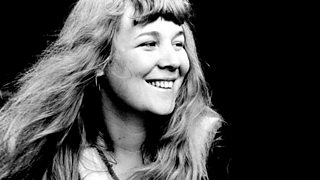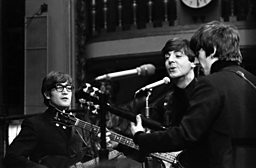Six love songs that celebrate growing older
When we think of love songs what usually springs to mind are the ballads that celebrate the passions of youth – but there are many classic songs that explore the notion of love as it evolves in later life.
Radio 4's Soul Music recently focussed on Neil Young’s Harvest Moon, a powerful representation of long-lasting love. Here are some other examples that show why love isn’t just the preserve of the young, but something – whether lost, gained or imagined – with us until our twilight years.
Neil Young – Harvest Moon

Released in 1992 this song was an ode to Young’s wife Pegi, and with its shimmering steel guitar and simple, poignant lyrics and chord structure, has become a go-to song for couples in long-term relationships.
For people that love to dance together... it's just a beautiful song.
The harvest moon of the title adds an almost pagan mysticism to the act of dancing described in the lines There’s a full moon risin’ / Let’s go dancin’ in the light. We know where the music’s playin’ / Let’s go out and feel the night. The song’s affirmation of love is heightened by this backdrop with the lines Because I’m still in love with you / On this harvest moon.
In the episode of Soul Music dedicated to Harvest Moon we hear from several people for whom the song has had a special reverence, aptly summed up by Alison Young, a Scottish music blogger talking about her long-term relationship with her husband: "A harvest moon is a kind of autumnal moon and being realistic we are probably in the autumn of our years now... I kind of felt it was a bit of a metaphor for long lasting relationships... for people that love to dance together... it's just a beautiful song."
Moon River – Henry Mancini / Johnny Mercer

A song that also features a moon, and also features in an episode of Soul Music, but not a love song in the traditional sense. What Moon River does have is a wistfulness relating to time, and a longing for both the past and future.
Written by Henry Mancini with lyrics by Johnny Mercer for the 1961 film Breakfast At Tiffany’s, it was originally sung by the central character Holly (played by Audrey Hepburn) and has been covered numerous times since.
For Mercer, the song is about childhood memories of picking huckleberries by the river, but the song’s haunting melody and lyrics suggest a place and time not yet discovered by the two young drifters “off to see the world”. As Robert Wright says in his decoding of the song, it is actually “a love song to wanderlust”, to the future, and in a sense to growing older.
Days – The Kinks

A song that has grown in stature over the years interestingly had humble beginnings. Rush-released in 1968 after the previous single from The Kinks’ concept album, The Kinks Are The Village Green Preservation Society, flopped, Ray Davies penned the song as a parting shot to the music industry he thought he was about to exit, and also as a farewell to his sister Rosie who had emigrated to Australia. He also went on to say later that it was inspired partly by a phone conversation with someone he was "dropping".
Days was inspired partly by Ray Davies's phone conversation with someone he was 'dropping'...
But as Soul Music’s episode on the song demonstrates, it has gone on to represent far more substantial feelings to people, as a farewell song to those lost, especially those once loved. One of the actors in The Kinks' West End show, Sunny Afternoon, describes the song as a personal homage to his older brother who took his own life after suffering from mental health issues and depression.
The song contains darker phrases like The night is dark, / It just brings sorrow anyway and But it's all right, / Now I'm not frightened of this world, believe me which belie the more uplifting nature of the music. For many others it is simply a song of remembrance of good times past. Thank you for the days / Those endless days, those sacred days you gave me. I’m thinking of the days / I won’t forget a single day, believe me.
Grow Old With Me – Mary Chapin Carpenter
Another song from a Beatle, this time John Lennon, who sadly only got to record a demo version of it before his untimely death in 1980.

This cover version by Mary Chapin Carpenter was recorded for the 1995 album Working Class Hero: A Tribute to John Lenno; it mostly remains true to the original recording’s piano and vocal arrangement but benefits from Carpenter's intimate, silky vocal delivery. The lyrics are a sentimental homage to lifelong love, made all the more tragic by Lennon’s early death.
Who Knows Where The Time Goes? – Sandy Denny
Songs of loss do not get any more wistful than this beautiful reflection on life and time by Sandy Denny. Written when Sandy was only 19 years old, it has a maturity that transcends her years. A musing on time, it is also a musing on love and the wonder of life itself. She recorded the song when she was a member of the folk-rock band Fairport Convention, but after leaving, the band failed to capitalise on her earlier success. Tragically her life spiralled into depression and alcohol abuse, and she died at the age of 31 after a series of falls, the last of which left her in a coma that she never recovered from.
When I’m 64 – The Beatles

From their Sergeant Pepper’s Lonely Hearts Club Band album, the music for this song was originally conceived by 16-year-old Paul McCartney long before the album was made, but he ended up writing the lyrics to it allegedly in honour of his father’s 64th birthday in the same year it was recorded.
The song poses the question, Will you still need me, will you still feed me / When I'm sixty-four?, the narrator looking ahead as a young man to the days when he and his lover will be old. In a lot of ways it is a song about enduring love, but it is anticipating the future rather than being retrospective. The quirky nature of the musical production doesn’t detract from the touching sentiment of the lyrics, especially in lines such as You'll be older too / And if you say the word / I could stay with you.





